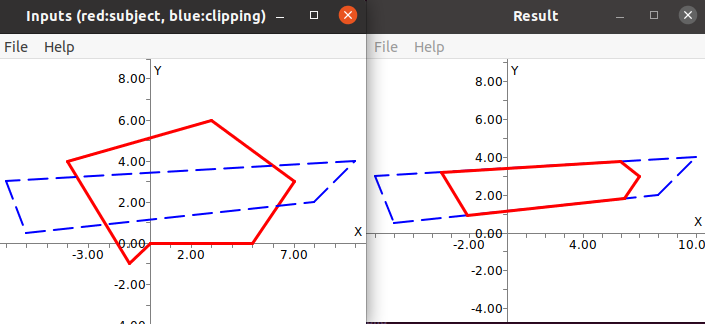Example: math_polygon_intersection
Example for the C++ function mrpt::math::intersect(const TPolygon2D& subject, const TPolygon2D& clipping) for polygon clipping or intersection using the Sutherland-Hodgman algorithm.




C++ example source code:
/* +------------------------------------------------------------------------+ | Mobile Robot Programming Toolkit (MRPT) | | https://www.mrpt.org/ | | | | Copyright (c) 2005-2023, Individual contributors, see AUTHORS file | | See: https://www.mrpt.org/Authors - All rights reserved. | | Released under BSD License. See: https://www.mrpt.org/License | +------------------------------------------------------------------------+ */ #include <mrpt/gui/CDisplayWindowPlots.h> #include <mrpt/math/TObject2D.h> #include <mrpt/math/TPolygon2D.h> #include <mrpt/math/geometry.h> #include <iostream> static void polygonClippingExample() { // Define the polygons: const mrpt::math::TPolygon2D subject = {{ {0.0, 0.0}, {5.0, 0.0}, {7.0, 3.0}, {3.0, 6.0}, {-4.0, 4.0}, {-1.0, -1.0} // }}; const mrpt::math::TPolygon2D clipping = {{ {-6.0, 0.5}, {8.0, 2.0}, {10.0, 4.0}, {-7.0, 3.0} // }}; // Compute intersection: mrpt::math::TObject2D clippedObj; bool doIntersect = mrpt::math::intersect(subject, clipping, clippedObj); ASSERT_(doIntersect); mrpt::math::TPolygon2D clippedPoly; bool isPoly = clippedObj.getPolygon(clippedPoly); ASSERT_(isPoly); // GUI: mrpt::gui::CDisplayWindowPlots winIn( "Inputs (red:subject, blue:clipping)", 500, 500); winIn.setPos(20, 50); const auto [x1, y1] = subject.getPlotData(); winIn.plot(x1, y1, "-r3"); winIn.hold_on(); const auto [x2, y2] = clipping.getPlotData(); winIn.plot(x2, y2, ":b2"); mrpt::gui::CDisplayWindowPlots winOut("Result", 500, 500); winOut.setPos(600, 50); winOut.plot(x2, y2, ":b2"); winOut.hold_on(); const auto [xp, yp] = clippedPoly.getPlotData(); winOut.plot(xp, yp, "-r3"); winIn.axis_equal(); winOut.axis_equal(); std::cout << "Press any key on input window or close it to end program.\n"; winIn.waitForKey(); } int main(int argc, char** argv) { try { polygonClippingExample(); return 0; } catch (const std::exception& e) { std::cout << e.what() << std::endl; return 1; } }